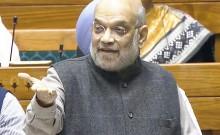
In a relief to over a crore pensioners, Prime Minister Narendra Modi on Monday launched "Jeevan Pramaan" – an Aadhar-based digital life certificate – which will be rolled out soon.
The government is working towards easing lives of crores of Indian citizens by making use of Aadhaar identification in issuance of passport and pensions for the retired government employees.
While the government has decided to do away with prior-police verification for issuing fresh passport with Aadhaar identification card, soon the pensioners too will not be required to submit physical "life certificate" each year as they can simply submit a digital report from anywhere in the country.
The department of electronics and information has already developed a software required to facilitate the process. The software application will help the pensioners enter their Aadhaar number and biometric details by plugging in an inexpensive biometric reading device into their smartphone or personal computer, The Times of India reported.
After entering the Aadhaar number, the date, time and "biometric information will be uploaded to a central database on real-time basis", which the pension disbursing agencies will be able to access as digital life certificates.
For those living in remote and inaccessible areas, common service centres being operated under the National e-Governance Plan will be equipped with the aforesaid facility.
This will come as a huge relief to those who live on pensions and are required to go in person to the pension disbursing agency to submit a physical life certificate issued by Central Pension Accounting Office (CPAO) authorised person in November each year to continue receiving pensions.
It's not just the senior citizens who would benefit from Aadhaar. Every Indian will be relieved from the delay in passport issuance that often takes time due to prior-police verification. When implemented, the applicant will need to compulsorily put in his Aadhaar card number or Aadhaar enrolment number, if card has not been issued.
Ministry of external affairs' consular, passport and visa division pitched in this idea before home ministry, law ministry and Intelligence Bureau and held a discussion on Monday. Following this, the MEA asked the UIDAI to work on its implementation which is expected to be over by the end of November.
While the verification of applicant's identification and citizenship will be carried out with the details on Aadhaar, his crime records will be verified on the National Crime Records Bureau's (NCRB) database. The police verification, in this case, will be done after issuing the passport, according to the TOI report.
At present, a fresh or first-time passport is issued only after police verification, which is either not required or carried out post issuance in case of minor applicants, tatkal applications and re-issue.
The central government's efforts to make the passport issuance procedure hassle-free for its citizens and to do away with senior citizens' trouble of getting a life certificate to continue availing pension, will come as a greater relief for majority of India's population.












